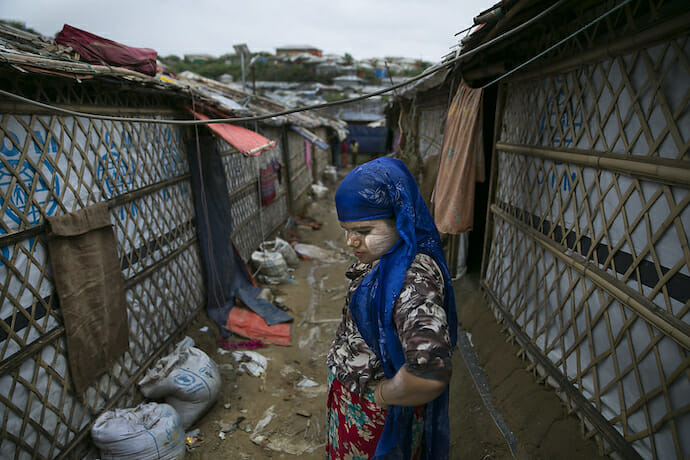The Platform
Latest Articles
by Kanan Heydarov
by Manahil Jaffer
by Mutalib Jibril
by Sehr Rushmeen
by Gordon Feller
by James Carlini
by Muhammad Zain Ul Abdin
by Ismaila Biliaminu Manne
by Ismaila Biliaminu Manne
by Kanan Heydarov
by Manahil Jaffer
by Mutalib Jibril
by Sehr Rushmeen
by Gordon Feller
by James Carlini
by Muhammad Zain Ul Abdin
by Ismaila Biliaminu Manne
by Ismaila Biliaminu Manne
UNHRC Resolution on Myanmar: An Analysis
08.02.2021
In July, the UN Human Rights Council (UNHRC) unanimously adopted a resolution on the Rohingya crisis.
The main reason for this is that although many resolutions on the Rohingya crisis have been adopted by the United Nations before, the difference between this resolution and other resolutions is that this resolution was adopted on the basis of a unanimous decision. In almost all the resolutions that have been passed before, China, Russia, India, Japan, various countries in Africa, and several countries in Southeast Asia, have either taken a stand against the proposal or abstained from voting.
Despite the documented genocide against Rohingya Muslims, the international community has not acted against Myanmar. Though the issue of genocide against the Rohingya has been raised in different UN forums, it was not possible to bring all the member states into agreement on next steps. Even for countries in South Asia including India, Sri Lanka, Nepal, and Bhutan, have not signed onto any resolution against Myanmar. They either opposed or abstained from voting.
Although there has been sharp disagreement among UN member states over the resolution, in the end, the resolution was passed unanimously. Bangladesh was able to bring the international community together for the very first time to act on the Rohingya crisis. Why was the passing of the resolution on the Rohingya crisis so important and what does it mean for Bangladesh?

The resolution is important in three respects. First, the resolution acknowledges the contributions of Bangladesh. Bangladesh, along with various aid agencies, has provided shelter for over a million Rohingya refugees. However, international funding and attention is waning and thus, pressure on Bangladesh has increased. Apart from other social, political, and environmental problems, a great deal of economic pressure falls on Bangladesh to house over a million refugees. The resolution, adopted by the UNHRC, calls on all member states to stand with Bangladesh by increasing international cooperation in the support of displaced Myanmar nationals.
Second, another significant aspect of the resolution is bringing the perpetrators of torture, rape, murder, and other crimes against humanity to trial. With the support of Bangladesh and other members of the Organization of the Islamic Cooperation, Gambia has already raised the issue at the International Court of Justice over charges of genocide committed against Rohingya Muslims. The International Criminal Court has also expressed support for the ongoing trial against Myanmar officials, past and present, which could include Aung San Suu Kyi. The significance of this resolution is to obtain the tacit endorsement of China, Russia, Japan, and India who have always sided with Myanmar on the Rohingya issue.
Third, the resolution puts emphasis on further actions based on the recommendations of a report by a United Nations fact-finding mission, published in August 2018. It is pertinent to note that in 2016 when the Rohingya were being oppressed in Rakhine, about 87,000 Rohingya fled to Bangladesh. An independent fact-finding mission was formed at the time, led by former UN Secretary-General Kofi Annan. Despite the Annan Commission’s report dated August 24, 2017, new incidents of murder, rape, torture, and genocide began in Rakhine on August 25. As a result, the Annan Commission’s report and its significance were overshadowed by the severity of the brutality of the Tatmadaw. In such a context, the UN formed a three-member fact-finding mission to re-investigate incidents in 2017, which released its report in August 2018. The UNHRC resolution unanimously accepted and acknowledged the importance of implementing the recommendations of the Annan Commission and the fact-finding mission.
The UNHRC resolution is a diplomatic achievement by Bangladesh to bring China, Russia, Japan, and India into agreement. The process of repatriation of the Rohingya will also be expedited if the process of implementation of the recommendations of the independent commission is started and if those responsible for genocide against the Rohingya are brought to justice. If that happens, a long-term and lasting solution to the Rohingya refugee crisis could pave the way for Bangladesh to come out from the current mountainous burden of the refugee crisis.
Shaikh Abdur Rahman graduated from the University of Rajshahi. Shaikh currently works at the Central Foundation for International and Strategic Studies (CFISS) in Dhaka, Bangladesh.
